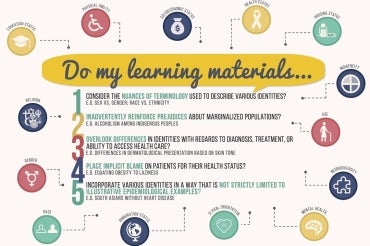Student Club Promotes Diversity In and Out of the Classroom

Published: October 3, 2016
How are you representing diversity in your course materials? That’s the question the Social Justice in Medical Education club is asking of Faculty of Medicine instructors.
“Our club was formed out of a discussion between a number of students about how identity was represented and discussed in our course materials. We wanted to have a forum where we could continue and sustain the conversation,” said Gaurav Sharma, a second-year medical student.
As a first step, the club asked students to identify gaps or potential issues they’ve encountered in courses during the first two years of the MD program. That feedback was distilled into five key points of reflection for instructors that has been turned into a graphic and accompanying background document, which is being distributed to all instructors this year. It was developed in consultation with faculty members, including Pre-Clerkship Director Dr. Pier Bryden, Chief Diversity Officer Dr. Lisa Robinson and Dr. Lisa Richardson, the co-lead of the Indigenous Health Education program.
“A lot of the issues raised in our questionnaire were not the result of intentional actions, but were the result of unconscious bias,” said Elise Jackson, also a second year medical student. “Our tool encourages instructors to think critically about how various social identities are portrayed in lectures.”
This is only the latest project undertaken by the club, which was established in January 2016. Its focus, Jackson explained, is on promoting social justice both within and beyond the curriculum. That has included hosting events, such as a discussion on how the Black Lives Matter movement relates to medicine. The group also organized an interactive workshop as part of orientation for new MD students in August. Nearly 200 students participated in the workshop, which focused on creating an inclusive class culture, including providing verbal space for follow students. Participants came to better understand how mental health, race, gender and socio-economic status can lead some to dominate conversations, while leaving others silenced.
“We want to foster an inclusive culture and we realized that to do that effectively, we had to encourage it right from the beginning,” said Sharma. While the group is still reviewing evaluations from participants, Sharma said he and other facilitators have been approached by first-year students expressing their appreciation for the workshop and how it has allowed for important conversations.
As part of the new Foundations Curriculum, first year students will also participate in a new workshop focused on cultural safety and diversity in November. The Social Justice in Medical Education club has been working with Richardson and Robinson on the content for that workshop, which group members will help to deliver.
“We want to find ways that we keep this conversation going. It’s important that it not be relegated to one or two workshops, but that it’s something we’re always thinking about and discussing,” Jackson said.
For more information on the club and its upcoming activities, send an email to socialjustice.meded@gmail.com.



